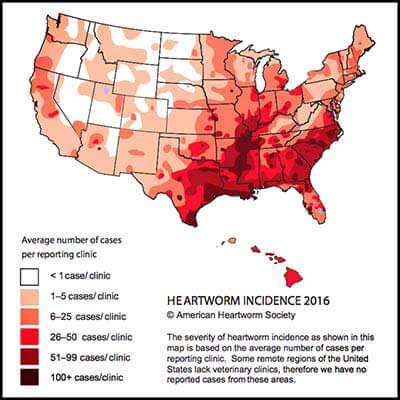Prevent Heartworm Disease Before It's too Late

It was right before lunchtime, and a couple rushed into the clinic with their white poodle. She coughed up a bloody foam, and her breathing was severely labored. “Please do something, she is suffering!” begged the couple to Chris Duke, DVM, veterinarian and American Heartworm Society (AHS) board member.
“I’ll never forget it,” Dr. Duke said. “We quickly went through the normal list of questions. ‘When did she last eat? When did she last drink? Please share any history that you possibly can. The couple responded that she had been fine, saying, ‘She must have been poisoned!’”
Dr. Duke pulled blood and listened to her heart and lungs.
“I heard a murmur on the right side of her heart, it was bad,” Dr. Duke said. “We gave her oxygen to help her breathe. When the results returned, she was heartworm positive. The owners were shocked, exclaiming that it just couldn’t be, 'She's a house dog.’ Soon, the dog choked and went into cardiac arrest. We did everything we could to resuscitate and couldn’t get her back.”
Even more heart wrenching? The couple had a monthly heartworm preventative sitting on their shelf at home, which the poodle never received.
At least one dog per day is diagnosed with heartworm disease at Dr. Duke’s clinic in Bienville Animal Medical Center, located in Ocean Springs, Mississippi. The area is infamous for its high mosquito population, being nearby the Gulf and Mississippi River, bayous and bogs.

Image credit: American Heartworm Society
About Heartworm Disease
Heartworm disease is a serious and potentially fatal disease affecting a number of mammals, including cats, dogs, and in rare occasions, even humans. It is caused by foot-long worms (heartworms) that live in the heart, lungs and associated blood vessels of affected pets. Their lasting impact causes severe lung disease, heart failure and damage to other organs in the body. A pet’s very life is at stake, even if their heart just contains one heartworm. Heartworm disease has been diagnosed across all 50 states. Through prevention measures, including monthly heartworm medications, a pet’s life can be saved.
Transmission
Mosquitoes transmit heartworm disease. When adult female heartworms reside in an infected animal, they produce microscopic baby worms (microfilaria) that circulate in the infected animal’s bloodstream. As a mosquito feeds on a heartworm-positive animal, it picks up these baby worms and deposits the larvae onto the surface of the next animal it feeds on, allowing the host entrance through the mosquito’s bite wound. It only takes the larvae six months to develop into a mature heartworm after entering the new host. Once mature, heartworms can live up to seven years in dogs and three years in cats.
Symptoms
Within the earliest stages, most pets will not demonstrate any symptoms of heartworm disease. As the disease progresses over time, affected dogs may develop a persistent cough, fatigue, decreased appetite and weight loss. Dogs with increased numbers of heartworms are at risk for cardiovascular collapse, as the worms suddenly block blood flow within the heart.
Heartworm disease symptoms in cats can be more difficult to define. Keep a watchful eye for symptoms such as asthma-like attacks, decreased appetite, vomiting and weight loss. Cats also may experience fainting episodes and difficulty walking. Sadly, the first sign in many cases of heartworm disease in cats consists of sudden collapse or sudden death. As their heart cavity is much smaller than that of the canine family, a single worm can end their life.
And unfortunately, with both dogs and cats, should they become infected with heartworms and survive, their lifespan will be shortened.
Prevention
Ensure heartworm testing is included in your pet’s annual exam with your veterinarian. Through a small blood sample, you can have peace of mind. The earlier heartworm disease is detected, the better the chances for your pet’s survival, should he test positive for heartworms.
A variety of monthly heartworm preventatives are available to help keep your pet safe and healthy. Remember the rule of 12. Every 12 months, ensure your pet is tested for heartworms, and remember to administer your pet one heartworm preventative every month. The risk of heartworm disease remains and is increasing. From 2013 to 2016, the number of heartworm cases jumped almost 22 percent. And although monthly heartworm preventatives offer nearly 100 percent efficacy and protection from deadly disease, only one in four pet owners give heartworm medication.
“I have two retrievers, Jake (think State Farm) and Flo (think Progressive) and our cat, Mikey. They always receive their monthly heartworm medication,” Dr. Duke said. “Don’t let your guard down. Pets need to have year-round prevention.”
Continue reading for more information:
Busting 5 Myths About Heartworm Disease


